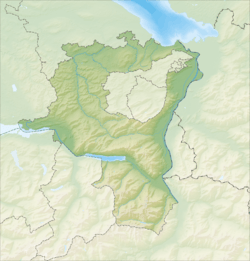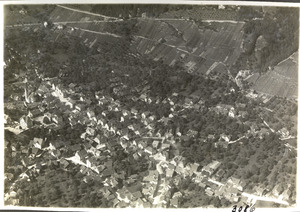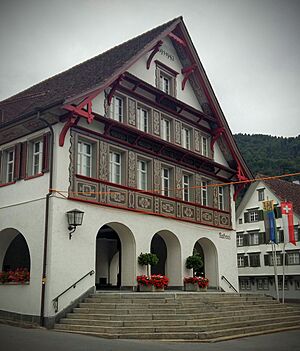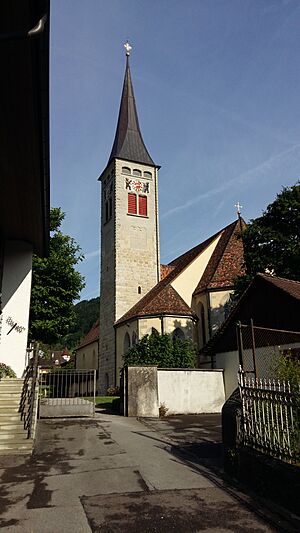Berneck, St. Gallen facts for kids
Quick facts for kids
Berneck
|
||
|---|---|---|
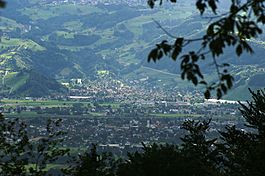 |
||
|
||
| Country | Switzerland | |
| Canton | St. Gallen | |
| District | Rheintal | |
| Area | ||
| • Total | 5.62 km2 (2.17 sq mi) | |
| Elevation | 404 m (1,325 ft) | |
| Population
(Dec 2020 )
|
||
| • Total | 3,928 | |
| • Density | 698.9/km2 (1,810.2/sq mi) | |
| Postal code |
9442
|
|
| Surrounded by | Au, Balgach, Oberegg (AI), Walzenhausen (AR) | |
Berneck is a small town, also called a municipality, located in the Rheintal area of Switzerland. It's part of the St. Gallen canton, which is like a state or region in Switzerland.
Contents
History of Berneck
Berneck has a long history! It was first written about in the year 892, when it was called Farniwang. Later, in 1210, its name changed to Bernanc.
Berneck's Coat of Arms
Berneck's coat of arms is pretty cool! It shows a black bear holding a red stake with a green vine wrapped around it. The vine has blue grapes.
This design is a bit of a visual pun. The German word for bear is Bär, which sounds a lot like "Bern," part of the town's name. This is called "canting arms," where the picture on the shield gives a hint about the name.
Geography and Landscape
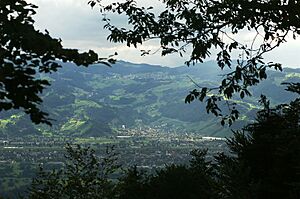
Berneck covers an area of about 5.6 square kilometers (about 2.2 square miles). A big part of this land, almost half (49.6%), is used for farming. About 29.6% is covered by forests. The rest of the land (20.3%) has buildings and roads, and a tiny bit (0.5%) is rivers or lakes.
The town is nestled between hills and a side channel of the Rhine valley. Besides the main village of Berneck, it also includes smaller communities called hamlets. These are Kobel, Rüden, Taa, Husen, Hinterburg, and Buechholz.
Population and People
Berneck has a population of about 3,233 people. Around 16.8% of the people living here are from other countries. Many of these foreign residents come from Germany, Italy, former Yugoslavia, and Austria.
Most people in Berneck speak German (93.3%). A smaller number speak Italian (1.9%) or Albanian (1.6%).
Age Groups
The people in Berneck come in all ages!
- About 12% of the population are children aged 0 to 9 years old.
- Around 15.4% are teenagers aged 10 to 19.
- Adults aged 20 to 59 make up about 53.7% of the population.
- Seniors aged 60 and older make up about 18.9% of the population.
Living Arrangements
In Berneck, many people live in families.
- About 11.6% of people live alone.
- Around 22.2% are couples without children.
- A large group, 55.8%, are couples with children.
- About 6.3% live in single-parent homes.
Education in Berneck
People in Switzerland are generally well-educated. In Berneck, about 76.1% of adults (aged 25-64) have finished either advanced high school or gone on to higher education like university.
Historical Population
Here's how Berneck's population has changed over the years:
| year | population |
|---|---|
| 1837 | 2,564 |
| 1850 | 2,044 |
| 1900 | 2,250 |
| 1930 | 2,096 |
| 1950 | 2,390 |
| 2000 | 3,289 |
Economy and Jobs
In 2007, Berneck had a low unemployment rate of 1.64%, meaning most people who wanted jobs had them.
The town's economy has different types of jobs:
- Primary sector: This includes jobs like farming. About 109 people work in this area.
- Secondary sector: This involves manufacturing and making things. About 725 people work in this sector.
- Tertiary sector: This covers services, like shops, offices, and healthcare. About 782 people work in this sector.
Many people who live in Berneck also work there. However, many residents (1,061 people) travel outside Berneck for their jobs. Also, many people (1,118) travel into Berneck to work.
Religion
Based on a survey from 2000:
- About 49.5% of the people in Berneck are Roman Catholic.
- Around 33.7% belong to the Swiss Reformed Church (a Protestant church).
- Smaller groups belong to other Christian churches, the Islamic faith, or no religion at all.
Places to See
Berneck has some special places that are part of the Inventory of Swiss Heritage Sites. These are important areas that show Switzerland's history and culture.
- The main village of Berneck itself is one of these sites.
- There's also an area called Schlosslandschaft Ober/Unterrheintal, which means "Castle Landscape." This area has many castles and spreads across several towns, including Berneck.
- Another special area is the shared village of Balgach/Herrbrugg, which is partly in Berneck.
Famous People from Berneck
Berneck is home to some notable people!
- Johannes Dierauer: A historian and librarian.
- Felix Indermaur: A winemaker and clergyman.
- Rahel Indermaur: An opera singer.
People with Family Ties to Berneck
- Heinrich Federer: A Catholic priest whose father was from Berneck.
- Roger Federer: A world-famous tennis player whose father is from Berneck.
Notable Families
- Federer family
- In der Maur
See also
 In Spanish: Berneck para niños
In Spanish: Berneck para niños




